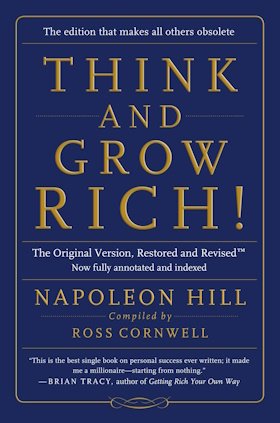The Tenth Step toward Riches
The meaning of the word "transmute" is, in simple language, "the changing, or transferring of one element, or form of energy, into another."
The emotion of sex brings into being a state of mind.
Because of ignorance on the subject, this state of mind is generally associated with the physical, and because of improper influences, to which most people have been subjected, in acquiring knowledge of sex, things essentially physical have highly biased the mind.
The emotion of sex has back of it the possibility of three constructive potentialities, they are:—
1. The perpetuation of mankind.
2. The maintenance of health, (as a therapeutic agency, it has no equal).
3. The transformation of mediocrity into genius through transmutation.
Sex transmutation is simple and easily explained. It means the switching of the mind from thoughts of physical expression, to thoughts of some other nature.
Sex desire is the most powerful of human desires. When driven by this desire, men develop keenness of imagination, courage, will-power, persistence, and creative ability unknown to them at other times. So strong and impelling is the desire for sexual contact that men freely run the risk of life and reputation to indulge it. When harnessed, and redirected along other lines, this motivating force maintains all of its attributes of keenness of imagination, courage, etc., which may be used as powerful creative forces in literature, art, or in any other profession or calling, including, of course, the accumulation of riches.
The transmutation of sex energy calls for the exercise of will-power, to be sure, but the reward is worth the effort. The desire for sexual expression is inborn and natural. The desire cannot, and should not be submerged or eliminated. But it should be given an outlet through forms of expression which enrich the body, Do You Feel Frustrated, Stuck Or Overwhelmed by the Concepts in this eBook?
174
Discover How To Begin Moving Forward with FREE Audio & Video Training at :
www.think-and-grow-rich-ebook.com
THINK & GROW RICH
mind, and spirit of man. If not given this form of outlet, through transmutation, it will seek outlets through purely physical channels.
A river may be dammed, and its water controlled for a time, but eventually, it will force an outlet. The same is true of the emotion of sex. It may be submerged and controlled for a time, but its very nature causes it to be ever seeking means of expression. If it is not transmuted into some creative effort it will find a less worthy outlet.
Fortunate, indeed, is the person who has discovered how to give sex emotion an outlet through some form of creative effort, for he has, by that discovery, lifted himself to the status of a genius.
Scientific research has disclosed these significant facts:
1. The men of greatest achievement are men with highly developed sex natures; men who have learned the art of sex transmutation.
2. The men who have accumulated great fortunes and achieved outstanding recognition in literature, art, industry, architecture, and the professions, were motivated by the influence of a woman.
The research from which these astounding discoveries were made, went back through the pages of biography and history for more than two thousand years. Wherever there was evidence available in connection with the lives of men and women of great achievement, it indicated most convincingly that they possessed highly developed sex natures.
The emotion of sex is an "irresistible force," against which there can be no such opposition as an "immovable body." When driven by this emotion, men become gifted with a super power for action. Understand this truth, and you will catch the significance of the statement that sex transmutation will lift one to the status of a genius.
The emotion of sex contains the secret of creative ability.
Destroy the sex glands, whether in man or beast, and you have removed the major source of action. For proof of this, observe what happens to any animal after it has been castrated. A bull becomes as docile as a cow after it has been altered sexually. Sex alteration takes out of the male, whether man or beast, all the FIGHT that was in him. Sex alteration of the female has the same effect.
THE TEN MIND STIMULI
Do You Feel Frustrated, Stuck Or Overwhelmed by the Concepts in this eBook?
175
Discover How To Begin Moving Forward with FREE Audio & Video Training at :
www.think-and-grow-rich-ebook.com
THINK & GROW RICH
The human mind responds to stimuli, through which it may be "keyed up"
to high rates of vibration, known as enthusiasm, creative imagination, intense desire, etc. The stimuli to which the mind responds most freely are:—
1. The desire for sex expression
2. Love
3. A burning desire for fame, power, or financial gain, MONEY
4. Music
5. Friendship between either those of the same sex, or those of the opposite sex.
6. A Master Mind alliance based upon the harmony of two or more people who ally themselves for spiritual or temporal advancement.
7. Mutual suffering, such as that experienced by people who are persecuted.

























